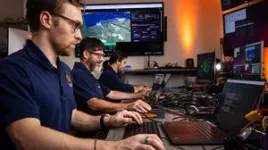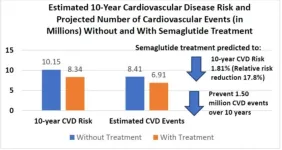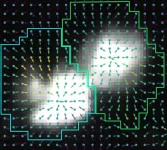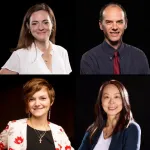(Press-News.org) The new project creates opportunities for researchers from historically underrepresented groups to develop technology that will help us understand the forces behind an expanding universe.
The U.S. Department of Energy’s (DOE) Argonne National Laboratory and the Missouri University of Science and Technology (Missouri S&T) have been awarded funding for a program that aims to generate insights about the universe while expanding diversity in the high energy physics field.
Through the $589,000, three-year grant from DOE’s Funding for Accelerated, Inclusive Research (FAIR) initiative, the research team will create a computer modeling framework to map a set of distant galaxies known as emission line galaxies. The grant also supports the participation of students from historically underrepresented groups.
Shun Saito, assistant professor of physics at Missouri S&T, is leading the research project with Andrew Hearin, an Argonne physicist, as the DOE national laboratory partner. The goal is to unravel some of the mystery surrounding dark energy, the force thought to drive the universe’s accelerated expansion.
“You really need supercomputing resources to be able to make predictions for galaxies in the large volumes we are simulating. Our modeling approach has been designed from the ground up to do exactly that.” — Andrew Hearin, Argonne physicist
The project relates to the DOE-funded Dark Energy Spectroscopic Instrument (DESI), which is measuring the trajectory of this expansion by mapping emission line galaxies. Emission lines are light signals emanating from galaxies across billions of years. These lines can be used in mapping the galaxies and determining their histories. Saito and team will build a simulation-based framework to predict a clustering pattern of faraway emission line galaxies that can then be used to understand the nature of dark energy.
“In the last decade, we have seen a lot of progress in measuring the nearby universe,” Saito said. “Now we want to locate more distant galaxies to fully map out the evolution of cosmological expansion.”
The research will take advantage of high performance computing at Argonne’s Laboratory Computing Resource Center.
“You really need supercomputing resources to be able to make predictions for galaxies in the large volumes we are simulating,” Hearin said. “Our modeling approach has been designed from the ground up to do exactly that.”
The project continues efforts by Saito and Hearin, who are longtime collaborators, to create a more inclusive community of high energy physics researchers. In 2019, they founded the Midwest Cosmology Network to provide a collaborative forum for researchers who belong to relatively small, isolated cosmology groups at colleges and universities.
In addition to research positions for one undergraduate, doctorate and postdoctorate student each, the program will also enable the collaborative work at Argonne.
The resulting framework and data will be available to other researchers who seek to analyze data from DESI and similar surveys. “People working on understanding galaxies can use the catalogs generated by this project,” Saito said.
In total, the DOE Office of Science awarded $37 million in funding to 52 projects representing 44 institutions. Hearin’s and Saito’s project is one of 10 projects affiliated with Argonne to receive this funding. The FAIR initiative aims to build research capacity, infrastructure and expertise at institutions historically underrepresented in the Office of Science portfolio, including minority serving institutions and emerging research institutions.
Argonne National Laboratory seeks solutions to pressing national problems in science and technology. The nation’s first national laboratory, Argonne conducts leading-edge basic and applied scientific research in virtually every scientific discipline. Argonne researchers work closely with researchers from hundreds of companies, universities, and federal, state and municipal agencies to help them solve their specific problems, advance America’s scientific leadership and prepare the nation for a better future. With employees from more than 60 nations, Argonne is managed by UChicago Argonne, LLC for the U.S. Department of Energy’s Office of Science.
The U.S. Department of Energy’s Office of Science is the single largest supporter of basic research in the physical sciences in the United States and is working to address some of the most pressing challenges of our time. For more information, visit https://energy.gov/science.
END
Department of Energy grant supports inclusive high energy physics research
Argonne and the Missouri University of Science and Technology will bring junior researchers into a project examining distant galaxies and dark energy
2023-08-15
ELSE PRESS RELEASES FROM THIS DATE:
Could exposure to chemicals in plastics predispose you and your children to cardiovascular disease?
2023-08-15
RIVERSIDE, Calif. -- Exposure to environmental chemicals, including those in common plastic products, has been linked with an increased risk of cardiovascular disease, or CVD, the leading cause of death worldwide. According to the World Health Organization, 17.9 million people died from CVDs in 2019.
Changcheng Zhou, a professor of biomedical sciences in the School of Medicine at the University of California, Riverside, has received an eight-year award of nearly $6.8 million from the Revolutionizing Innovative, Visionary Environmental Health Research (RIVER) program of the National Institute of Environmental Health Sciences, or NIEHS, to investigate how ...
Cancer organizations recommend mindfulness-based interventions to treat anxiety and depression in patients
2023-08-15
WASHINGTON, D.C. (August 15, 2023) — The Society for Integrative Oncology (SIO) and the American Society of Clinical Oncology (ASCO) formally recommend mindfulness-based interventions (MBIs) and other integrative therapies to manage anxiety and depression symptoms in adults living with cancer. The guideline, published in the Journal of Clinical Oncology, reviews the effectiveness of integrative therapies such as yoga, relaxation, hypnosis, acupuncture, and music therapy in treating anxiety and depression symptoms during ...
Recent study at UC Irvine found that semaglutide medication may benefit 93 million U.S. adults
2023-08-15
Researchers from the University of California, Irvine have just published a study that projects 93 million U.S. adults that are overweight and obese may be suitable for the 2.4 mg dosage of semaglutide, a weight loss medication known under the brand name Wegovy.
They projected based on the known weight loss effects (15% average weight loss) of this therapy that its use could result in 43 million fewer people with obesity, and prevent up to 1.5 million heart attacks, strokes, and other adverse cardiovascular events over 10 years.
The study, US Population Eligibility and Estimated Impact of ...
Carnegie Mellon University developed AI method uses transformer models to study human cells
2023-08-15
Researchers in Carnegie Mellon University's School of Computer Science have developed a method that uses artificial intelligence to augment how cells are studied and could help scientists better understand and eventually treat disease.
Images of organ or tissue samples contain millions of cells. And while analyzing these cells in situ is an important part of biological research, such images make it nearly impossible to identify individual cells, determine their function and understand their organization. A technique called spatial transcriptomics ...
Kessler Foundation receives 4 grants totaling nearly $1.7 million from New Jersey Commission on Brain Injury Research
2023-08-15
East Hanover, NJ – August 15, 2023 – Kessler Foundation scientists received four grants from the New Jersey Commission on Brain Injury Research, totaling nearly $1.7 million for studies based on a variety of novel approaches aimed at improving the lives of individuals with traumatic brain injury (TBI). Researchers will use funds to address identity reconstruction, physical and mental fatigue, and upper limb (UL) function.
Helen Genova, PhD, associate director, Center for Autism Research, received $528,824 for her study, “Using my Strengths: Evaluation of a Strength-Based Intervention in Adults with TBl.” ...
CHOP researchers develop versatile and low-cost technology for targeted long-read RNA sequencing
2023-08-15
Philadelphia, August 15, 2023—In a development that could accelerate the discovery of new diagnostics and treatments, researchers at Children’s Hospital of Philadelphia (CHOP) have developed a versatile and low-cost technology for targeted sequencing of full-length RNA molecules. The technology, called TEQUILA-seq, is highly cost-effective compared to commercially available solutions for targeted RNA sequencing and can be adapted for different research and clinical purposes. The details were described in a paper in Nature Communications.
On the journey ...
New kidney function equation may reduce health disparities by improving access to heart failure therapy in previously ineligible patients
2023-08-15
Physician-scientists from the University of Alabama at Birmingham Marnix E. Heersink School of Medicine recently conducted a large-scale analysis to assess the impact of a newly introduced equation used to evaluate one’s heart failure risk. The study, published in the Journal of Cardiac Failure, showed that the new and old kidney function equations had comparable values in predicting the risk of heart failure.
Naman Shetty, M.D., a clinical research fellow in the UAB Division of Cardiovascular Disease and ...
NIH supports UCF scientist to develop new antibiotic for TB
2023-08-15
BY SUHTLING WONG | AUGUST 15, 2023
A College of Medicine researcher is developing a new antibiotic related to penicillin to treat tuberculosis (TB) and related lung infections.
Dr. Kyle Rohde, an infectious disease expert, recently received a $3.4 million, five-year grant from the National Institutes of Health to create new antibiotics that target mycobacterial infections caused by pathogens such as Mycobacterium tuberculosis and Mycobacterium abscessus.
TB infected 11 million people in 2021, ranking it 13th as the leading cause of ...
An AI coach that improves your golf swing
2023-08-15
A University of Texas at Arlington researcher is working on the prototype of a golf swing training system that combines artificial intelligence (AI) with portability and can be used at home or on the driving range.
Nicholas Gans, a UT Arlington principal research scientist and division head for the UT Arlington Research Institute (UTARI), leads the project, which is funded by a nearly $53,000 grant from the University and Fort Worth-based IGSC.AI LLC. Gans’ initial work is considered a preliminary proof of concept.
“We’ll use a camera-based ...
Cleveland Clinic researchers identify novel host-based target against multiple mosquito-transmitted viruses
2023-08-15
New Cleveland Clinic research shows how mosquito-transmitted viruses – like Zika, West Nile, Yellow Fever and dengue viruses – hijack host cells to promote their own replication and infection. Published in Cell Host and Microbe, a recent study from the laboratory of Michaela Gack, Ph.D., Scientific Director of Cleveland Clinic’s Florida Research & Innovation Center, opens the door to developing new therapeutics for flaviviruses, a class of viruses for which either no or very limited treatments currently exist.
This is Dr. Gack’s first research study funded by a prestigious National ...
LAST 30 PRESS RELEASES:
Learning makes brain cells work together, not apart
Engineers improve infrared devices using century-old materials
Physicists mathematically create the first ‘ideal glass’
Microbe exposure may not protect against developing allergic disease
Forest damage in Europe to rise by around 20% by 2100 even if warming is limited to 2°C
Rapid population growth helped koala’s recovery from severe genetic bottleneck
CAR-expressing astrocytes target and clear amyloid-β in mouse model of Alzheimer’s disease
Unique Rubisco subunit boosts carbon assimilation in land plants
Climate change will drive increasing forest disturbances across Europe throughout the next century
Enhanced brain cells clear away dementia-related proteins
This odd little plant could help turbocharge crop yields
Flipped chromosomal segments drive natural selection
Whole-genome study of koalas transforms how we understand genetic risk in endangered species
Worcester Polytechnic Institute identifies new tool for predicting Alzheimer’s disease
HSS studies highlight advantages of osseointegration for people with an amputation
Buck Institute launches Healthspan Horizons to turn long-term health data into Actionable healthspan insights
University of Ottawa Heart Institute, the University of Ottawa and McGill University launch ARCHIMEDES to advance health research in Canada
The world’s largest brain research prize awarded for groundbreaking discoveries on how we sense touch and pain
Magnetofluids help to overcome challenges in left atrial appendage occlusion
Brain-clearing cells offer clues to slowing Alzheimer’s disease progression
mRNA therapy restores fertility in genetically infertile mice
Cloaked stem cells evade immune rejection in mice, pointing to a potential universal donor cell line
Growth in telemedicine has not improved mental health care access in rural areas, study finds
Pitt scientists engineer “living eye drop” to support corneal healing
Outcomes of older adults with advanced cancer who prefer quality of life vs prolonging survival
Lower music volume levels in fitness class and perceived exercise intensity
Of crocodiles, counting and conferences
AERA announces 2026 award winners in education research
Saving two lives with one fruit drop
Photonic chips advance real-time learning in spiking neural systems
[Press-News.org] Department of Energy grant supports inclusive high energy physics researchArgonne and the Missouri University of Science and Technology will bring junior researchers into a project examining distant galaxies and dark energy





